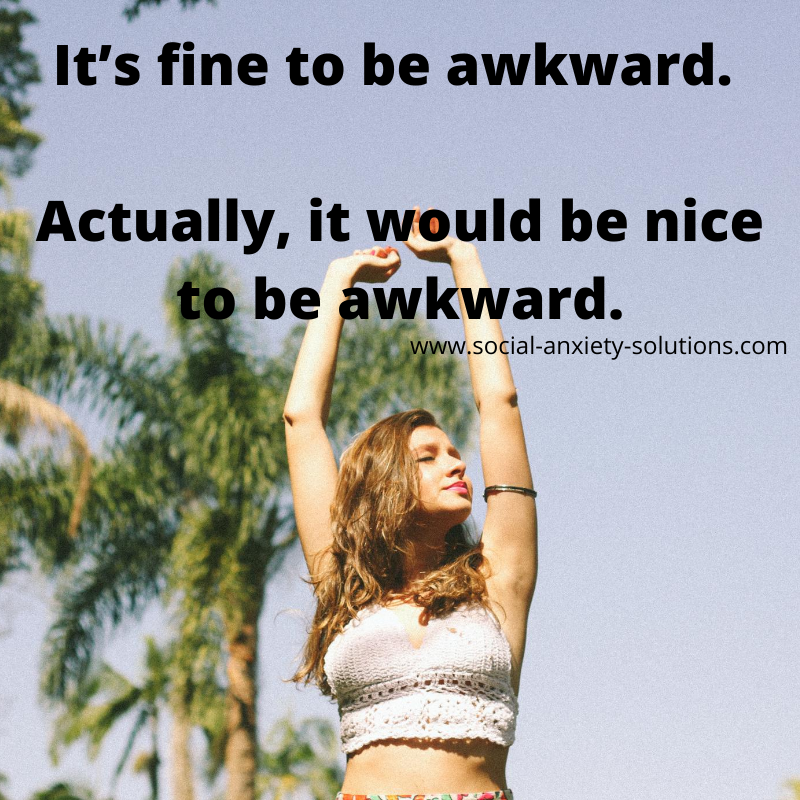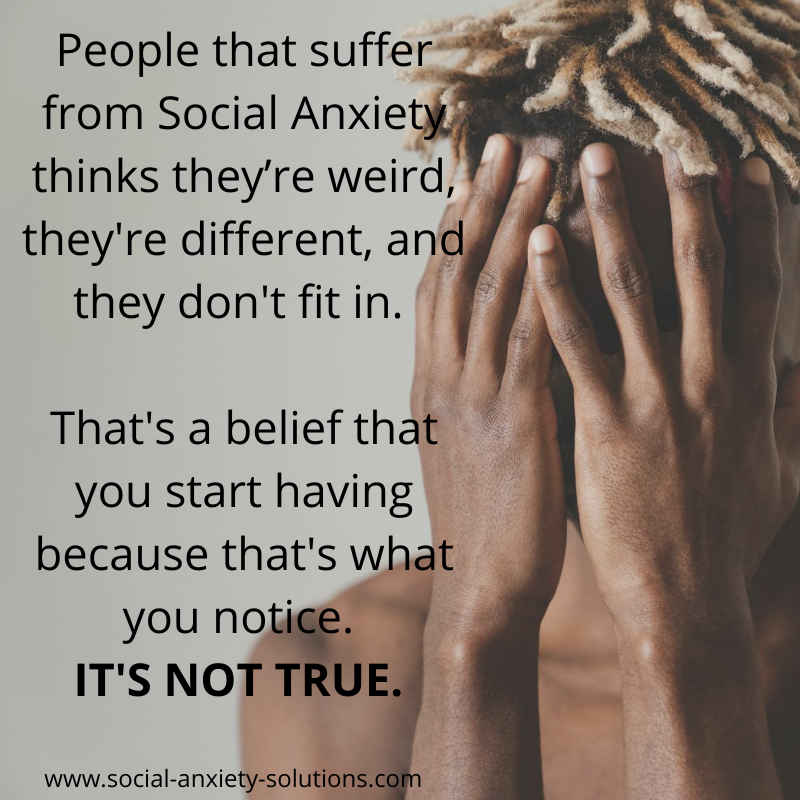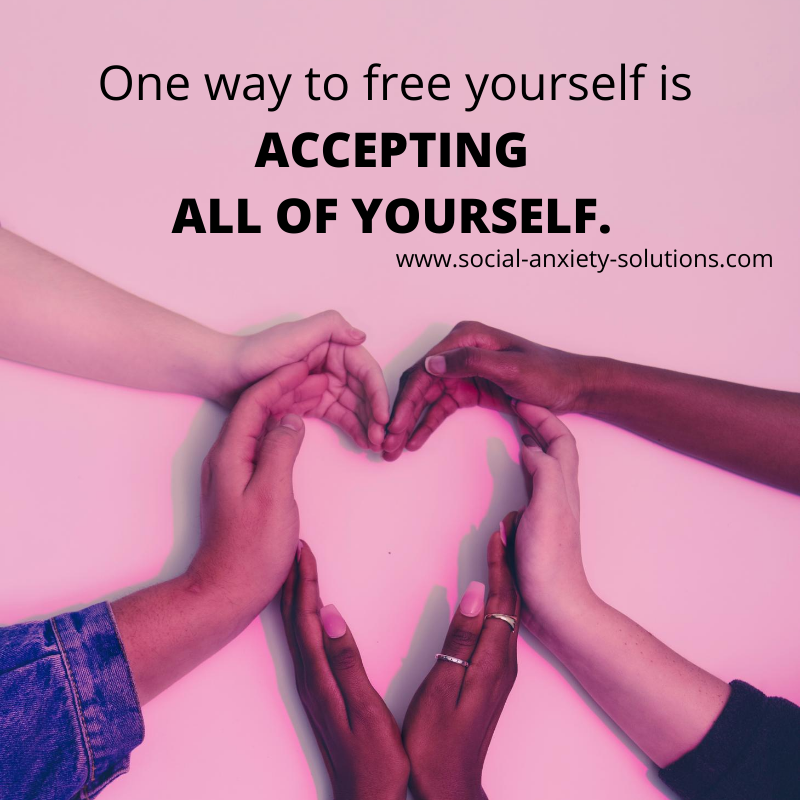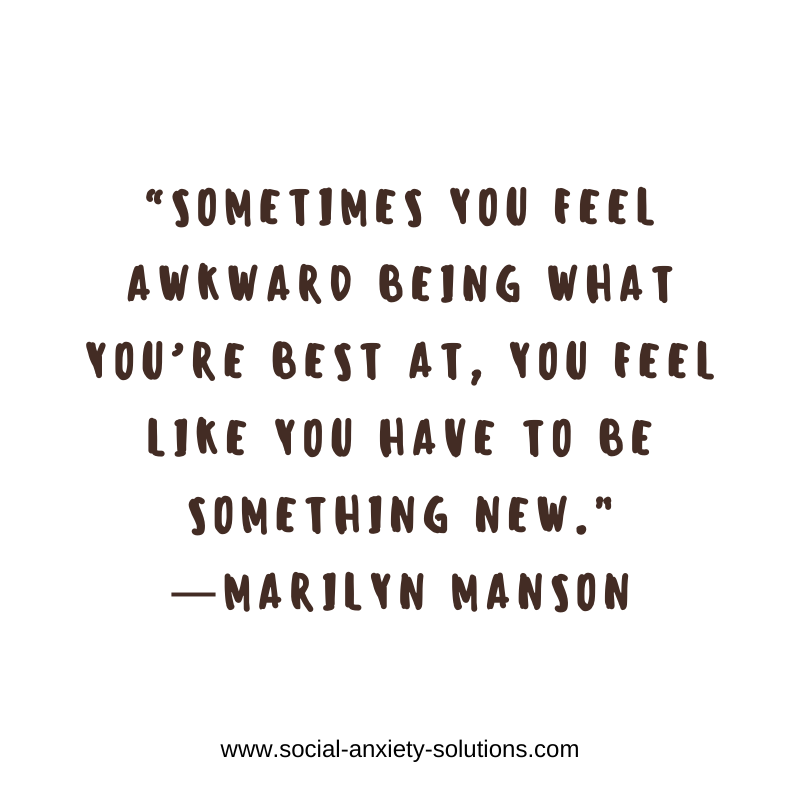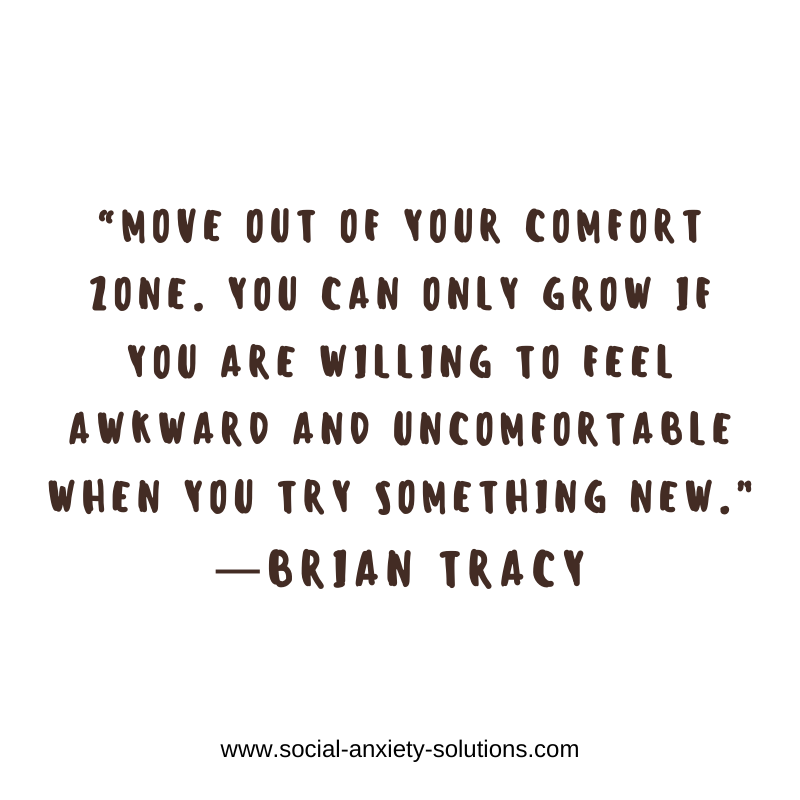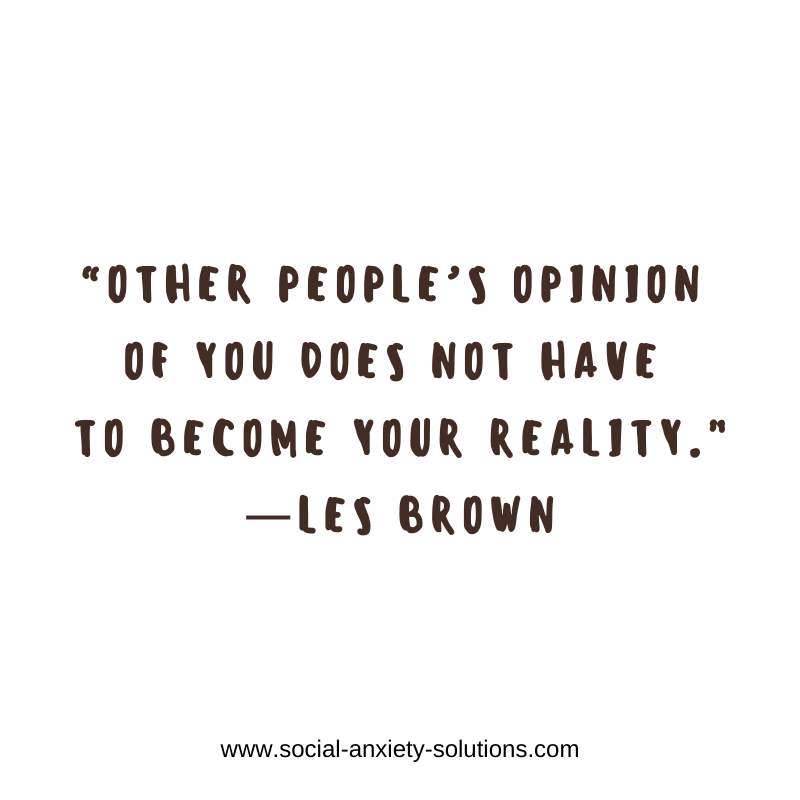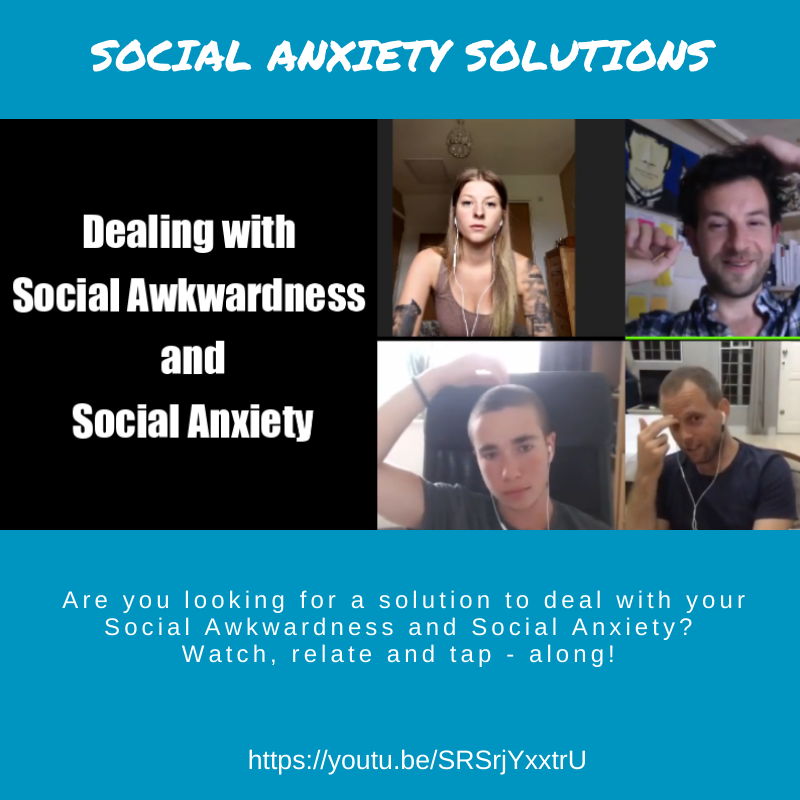SUMMARY
Do you have a fear of feeling awkward in a social situation?
Are you looking for a solution to deal with your feelings of awkwardness?
Then you are in the right spot.
In this episode, I will let you watch and witness a unique live coaching session that I did here on YouTube.
Watch, relate, and tap – along with Antoine as I coach him in dealing with his social awkwardness.
If you haven’t watched the FULL live coaching session, go to:
bit.ly/livesocialanxietycoaching
FULL TRANSCRIPTION
Hey there! My name is Lia and I’m with Sebastiaan van der Schrier from Team Social Anxiety Solutions.
Did you come here today to look for a solution in dealing with your feelings of awkwardness in social situations?
Are you tired of worrying about what to say or what not to say in the middle of a conversation?
Or do you want to get rid of fears about coming across as lame or weird or awkward to the person you’re talking to?
Then you came to the right place.
Today, I’m going to show you a video clip of a YouTube Live Coaching Session that
Sebastiaan did with Antoine.
Antoine is a Social Anxiety Sufferer who was participating in our Free 30-day Social Confidence Challenge at the time that the session happened. He already has a good understanding of important concepts that you need to know to overcome your social anxiety completely, such as self-acceptance, subconscious persistence, and most importantly the very powerful Emotional Freedom Technique or what we call “the tapping technique”.
Most likely than not, he has similar issues just like you. So I want you to watch this video until the very end so you’ll get to see how Antoine got a shift in perspective at the end of the tapping session that he did with Sebastiaan.
Check it out here:
Seb: Let me give feedback. What you’re saying is when I’m in a particular social situation I find myself getting really in my head and I feel limited. Debilitated was your word is that right?
Client: Yeah
Seb: So, that’s the description of the experience that you’re having typically and so the emotion that might be connected with that is for example frustration or maybe an annoyance or maybe anger or upset.
Client: It’s a mix of there is a bit of fear actually because it feels like you know you’re trapped in a sort of like a bubble of ice in some ways. There is also a bit of shame because as a response to when you’re in a group, you tend to smile or you might do things, but they’re not really in your control and you feel like being lame in some way.
Seb: Got you. Excellent. So, you’re a bit lame in some ways. You’re coming across a bit lame because of the anxiety that you’re experiencing – that’s right! A few things to say about that for one, what people often do is they start judging themselves to be socially inept. “Oh I just have crap social skills and what I need is more social skills. I’m bad at socializing, I’m probably introverted.”
No, no. That’s not true.
If you have a person like that, that you’re comfortable with, some people have their partner, or a family member, or a small kid, or whatever. If you have a person like that and you’re totally comfortable with, you have no problem socializing. You’re just saying whatever comes to mind and you’re not worried about the next thing you’re going to say.
So, your social skills just go out of the water when your whole system perceives a threat and activates the Fight-Flight-Freeze Response, which puts your whole body in survival mode. You can’t be thinking on your feet, you’re not funny in those moments, you can’t think of stories to say so it’s inaccurate to judge yourself to not have those kinds of social skills.
It’s the social anxiety that’s messing up your social skills.
When you’re comfortable in a situation like that, and you’re looking fine like a dumbass, and you’re fine saying stupid stuff, and you’re okay say you feel free to say whatever comes to mind, then you don’t have that problem. It’s the anxiety that’s causing that.
You probably already know that. But there are a bunch of people watching this so I want to point that out.
Client: But I just want to add that I also acknowledge my social anxiety 10 days before starting the challenge. Which beforehand, I just thought this was just a part of me? Like it was embedded into my identity that I didn’t even realize I had a problem. So, the diagnosis being so late, I just thought that I was a mess.
Seb: Right. How’s that now? How are you feeling about that now?
Client: Well it’s usually different. First of all, for example: acknowledging the concept of subconscious resistance was so helpful because that was mainly the reason why I wouldn’t want to be socially at ease with me to go back to the situations that I really hate.
Now that I’m addressing this, it’s opening up in miraculous ways, especially over the last five days or a few days when we’ve been working especially on that topic. So, I’m doing more on this.
Seb: Good stuff. Let’s take that to the next level. I’m just going to see how we’re doing on time. We are doing quite fine.
Right. So, another thing you said is I feel debilitated and kind of feel lame.
Well one way to free yourself or one part of effortless social ease (in other words just being yourself) is accepting all parts of yourself. That includes the part of you that’s lame.
We’re all lame. Me? A lot more than you would believe. When you come to terms with that; when you accept that – there’s actually lots of freedom in that. Because then you don’t have to hold back from being lame.
Then you can just say whatever some of it will be lame and it won’t bother you. Because if they point out “Ha! You’re lame.” You’re like “Yeah, I know! Tell me about it!”
There’s no downside to it anymore. The other thing you mentioned was the fear. I’ll get to that in a second. Let’s just first start with the lame stuff.
Just tap on the side of your hand.
By the way, I’m using a variety of techniques. This is my own style. I’ve been doing these for 14 years. It’s a conglomeration of a wide variety of techniques both from the tapping world, NLP provocative therapy, and a whole bunch of stuff. If I’m doing it wrong, fine. If I’m doing it right, great. It’s all good.
Just follow along with me so just say – Even though I am lame
Client: Even though I’m lame.
Seb: I have to admit it
Client: I have to admit it
Seb: It sucks
Client: It sucks
Seb: But it’s the truth
Client: But it’s the truth
Seb: I deeply and completely
Client: I deeply and completely
Seb: Reject myself
Client: Reject myself
Seb: (Tap on the beginning of the eyebrows) Because I’m so lame
Client: Because I’m so lame
Seb: Why would I accept myself?
Client: Why would I accept myself?
Seb: (Tap under the eyes) If I’m so lame
Client: If I’m so lame
Seb: (Tap under the nose) I’m supposed to be amazing
Client: I’m supposed to be amazing
Seb: (Tap on the chin) I have incredible talent
Client: I have incredible talent
Seb: (Tap on the collarbone) I’m so smart and sophisticated
Client: I’m so smart and sophisticated
Seb: (Tap under the arms) and yet I have this shitty social anxiety challenge
Client: and yet I have this shitty social anxiety challenge
Seb: (Tap on the liver point) I am so lame
Client: I am so lame
Seb: (Tap on the wrist point) No, I’m not
Client: No, I’m not.
Seb: (Tap on top of the head) Oh yes, I am.
Client: Oh yes, I am.
Seb: (Tap on the beginning of your eyebrows) It’s like I invented it
Client: It’s like I invented it
Seb: (Tap on the side of the eyes) I’m really good at being lame
Client: I’m really good at being lame
Seb: (Tap under the eyes) Sometimes I’m not lame
Client: Sometimes I’m not lame
Seb: (Tap under the nose) I have my moments
Client: I have my moments
Seb: (Tap on the chin) But I’m often enough, lame enough
Client: I’m often enough, lame enough
Seb: (Tap on the collarbone) I choose to accept myself anyway
Client: I choose to accept myself anyway
Seb: Deep breath…Thoughts? Feelings? What are you noticing?
Client: I mean, while we were doing it actually, that felt like what you said a week ago that thing about being smart, and for a long time I actually wondered if I had additional intellectual capabilities on some matters. It made me feel awkward because I didn’t really have it diagnosed or talked about it then. I sort of felt that I’m part of those guys that are meant to be awkward.
But what came along with that is obviously a self-rejection for anything that would be lame. Obviously, that would trigger some very strong judgment in me. So, it’s boosting the fear of judgment either my way towards others, or the way of others judging me. But it doesn’t matter.
One way or the other, it’s very painful to experience anyway.
Seb: Yes, it is.
Sorry, my internet’s a bit wonky, but can you hear me okay now? We’re still good?
Client: Yeah.
Seb: So, just say I’m meant to be awkward
Client: I’m meant to be awkward
Seb: 0 to 10 – how true does that feel?
Client: I’d say 8
Seb: (Tap on the beginning of the eyebrows) That’s a belief. And a belief is nothing more than a thought that has an emotion connected to it. That’s why it’s so damn difficult to change them by just being logical. I believe that I’m not good enough. You go to a therapist and he’s like “Let’s talk about all the things that are good about you. You’re a nice person, you have a good sense of humor, you help that lady cross the street. Look at you – you’re a good person.” You’re sitting in the office like “yeah, I’m so nice.”
But you go out into a social situation and boom that deeply written “I’m not good enough feeling” activates because that little reframing that you do as a 30 something-year-old, doesn’t do much for the emotions connected to it that actually have their roots in childhood.
That’s a more extreme example because that’s an identity belief “I’m not good enough.” What you’re talking about now, “I’m meant to be awkward” is not necessarily an identity belief it’s just kind of like capability belief, but it’s still an 8. So, it’s something that you’re kind of strongly attached to emotionally.
What the tapping does is it disconnects the emotion from the thought that you’re thinking. The simplest way to apply it, and by the way, it doesn’t always work in this way but this is this is the first way in and it always works (tapping) when you apply it in the right way, except for when you’re severely depressed or you have other issues.
I’m talking about social anxiety. It’s always working for social anxiety in my experience and I’ve been working with hundreds of people for 10 years.
The simple way to start off is to simply say –
(Tap on the chin) I’m meant to be awkward
Client: I’m meant to be awkward
Seb: (Tap on the collarbone) I am meant to be awkward
Client: I’m meant to be awkward
Seb: (Tap under the arms) This is true about me
Client: This is true about me
Seb: (Tap on the live point) I’m meant to be awkward
Client: I’m meant to be awkward
Seb: So it’s simply repeating the same thing from point to point. But we can get a little bit more fancy by going into some of the reasons why you believe that.
(Tap on the wrist point) I’m meant to be awkward
Client: I’m meant to be awkward
Seb: (Tap on top of the head) Because I’m so incredibly smart
Client: Because I’m so incredibly smart
Seb: (Tap on the beginning of the eyebrows) You should spend some time with me
Client: You should spend some time with me
Seb: (Tap on the side of the eyes) and you’d figure out how brilliant I am
Client: and you figure out how brilliant I am
Seb: (Tap under the eyes) And people as brilliant as me
Client: and people as brilliant as me
Seb: (Tap under the nose) They’re meant to be awkward
Client: They’re meant to be awkward
Seb: (Tap on the chin) and weird
Client: and weird
Seb: (Tap on the collarbone) Truth is I’m pretty weird
Client: Truth is I’m pretty weird
Seb: By the way, another almost universal belief for people that suffer from Social Anxiety, they think they’re weird, they’re different, they stand out, and they don’t fit in. That’s a belief that you start having because that’s what you notice.
It’s not true. It’s just because of the anxiety experience, that’s what happens. You kind of look weird and you appear weird at moments.
(Tap on the wrist point) Just say – I release all my emotional attachments
Client: I release all my emotional attachments
Seb: To I’m weird, and it’s bad
Client: I’m weird and it’s bad
Seb: (Tap on top of the head) I release all my emotional attachments
Client: I release all my emotional attachments
Seb: To I’m meant to be awkward
Client: To I’m meant to be awkward
Seb: (Tap on the beginning of the eyebrows) What are you noticing now?
Client: The thought that came around towards the end was its fine to be awkward. Actually, it would be nice to be awkward.
But, to accept that awkwardness to its full level, I’m thinking of some people that I considered as awkward but in a fully accepting way, like fully being themselves basically and playing with that awkwardness and making their show out of it which I would generally do the exact opposite, which would be contracting it.
Seb: Right. Good. Excellent!
Awkward is the enemy. But it’s actually very normal and its part of everyday life. I interviewed two of my friends and they’re very socially at ease. They were a couple at the time that I interviewed them and I asked them
“You know a lot of people with social anxiety have so much trouble with awkwardness. What do you with awkwardness?”
They’re like “What do you mean?”
I’m like “Well, do you ever experience it?”
They’re like “Yeah! Every day!”
I’m like “Oh okay.”
They’re like “Yeah it’s normal!”
“I mean you meet people and you kind of don’t know each other. You’re feeling each other out. You’re saying something inappropriate. Or they ask you for something you want to say no but you mean yes. Or you run into a person you haven’t seen for a while and like are you going to talk to?”
They’re like “yeah all the time!”
So it’s not just an experience for people with social anxiety. It’s just more blown out of proportion for people with social anxiety because they are NO TO AWKWARDNESS.
I have to avoid it at all costs and if it happens, it’s my fault. Not true. That’s just in your mind.
I’m just more saying that for other people. I think you’re quite aware of that but I don’t know.
How are you doing right now? How are you feeling right now?
Client: It’s quite down actually. Probably 1 instead of 4.
Seb: Cool. I’m going to leave you and I’m going to go back to Victoria.
— END OF COACHING —
Lia: All right I hope you got value out of this.
If so, subscribe to our YouTube channel so you’ll learn more about this Emotional Freedom Technique.
I encourage you to watch the full 90 minutes YouTube Live Coaching Session as you will get to appreciate more the power of tapping in dealing with your feelings of awkwardness and social anxiety.
Go to bit.ly/livesocialanxietycoaching
That’s all for now!
See you next Thursday.
— End of Transcription —
If you experience Social Anxiety, click below for a free video course to start to overcome it.
If you experience Social Anxiety, click below to receive the FREE “7 Secrets to Social Confidence” Mini Course!
- How To Stop Worrying - January 17, 2024
- How to Reduce Facial Blushing with EFT Tapping? - June 29, 2023
- Are You Scared to Get Anxious? Here’s how to fix it! - June 16, 2023


